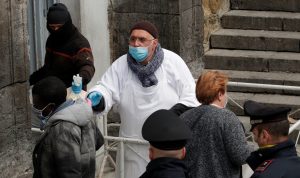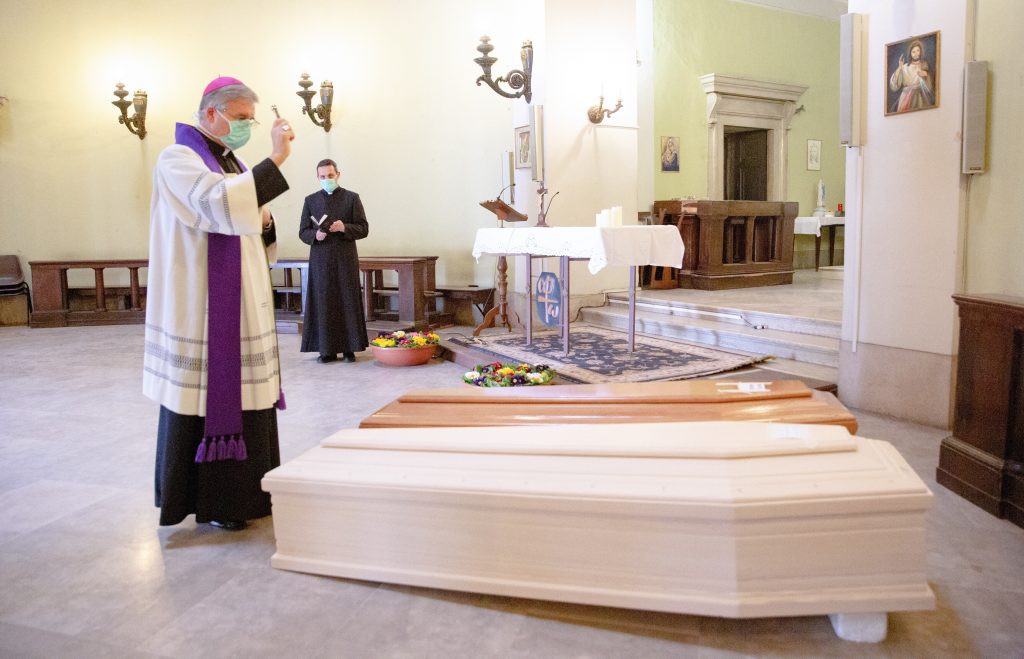ROME — Italy’s coronavirus (COVID-19)-related lockdown is now in its second month, and while the curve of the pandemic may be flattening here, the same cannot be said for a mounting intra-Catholic debate over how the Church has chosen to respond.
While the dispute may be more intense here than anywhere else, it has echoes everywhere bishops have to make hard choices about how much normal Church life to suspend or cancel amid the pandemic.
On the one hand are Catholics — a strong majority here, if recent polling is to be believed — who support the bishops’ decision to suspend all public Masses and the other sacraments, as a means of combating transmission of the virus.
If Catholicism is pro-life, the argument runs, then it can’t knowingly jeopardize public health, especially when the highest-risk group, the elderly, are already often victims of what Pope Francis has called a “throwaway culture.”
On the other side are critics who see the bishops here as essentially caving in to a secular mentality, one which holds that grocery stores, pharmacies, and even tobacco shops and newsstands are “essential services,” but religion isn’t and thus is dispensable.
Well-known Italian TV journalist and fervent Catholic Maurizio Scandurra recently complained the Italian bishops have “shut up and laid down like doormats before the current regulations” imposed by the government.
It’s a legitimate debate, but by putting the focus primarily on what the Church isn’t doing, there’s a risk of ignoring what it is.
The truth of it is, while the Church’s public liturgical and sacramental life may be on hold for a while, that hardly means Catholicism is out of business. I’ll speak here of examples from Italy, which is where I’m riding out the storm, but similar for-instances can be adduced from all over the world.
In the small community of Seriate in the province of Bergamo, where the death toll of the coronavirus has been especially intense, the Church of San Giuseppe (St. Joseph) removed its pews in order to provide temporary storage for coffins of victims slated for military transport elsewhere because there’s no longer places to bury them.
The pastor, Father Mario Carminati, comes down each day to say a prayer over the remains, and, when possible, uses WhatsApp to connect the family at least at a distance.
Also in the Diocese of Bergamo, the local seminary has opened 50 rooms for local doctors and nurses who need a place to get away for a few hours between shifts as they work around the clock in an effort to save as many lives as possible.

At least two cloistered communities of contemplative nuns, the Oblates of Avellino and the Benedictine Sisters of Marcogliano, have taken it upon themselves to interrupt their normal activities in order to make by hand the medical masks that Italians are required to wear whenever they leave home, but which have been nearly impossible to find.
So far the sisters have produced more than 100,000 masks, donating them free of charge to the public.
There’s the lay Community of Sant’Egidio in Rome, that’s opened a special hotline for the city’s elderly if they need medical care or someone to do the shopping, or if they’re simply alone and need consolation. In Gaeta, the Monastery of San Magno has opened its doors to 30 Red Cross volunteers who are the first responders of the pandemic.
Polish Cardinal Konrad Krajewski, the pope’s personal almoner, is driving 150 miles around Rome every day collecting food and other supplies that companies can’t use amid the crisis, and directing it to the poor, the homeless, migrants, and refugees, for whom “lockdown” doesn’t mean confinement in a personal home and regular trips to a grocery store.
Incredibly, Cardinal Krajewski actually published his personal cellphone number in Vatican News, the Vatican’s official communications outlet, inviting anyone in need to call for help.
There are also stories of priestly heroism, such as Father Fausto Resmini of Bergamo. He was a well-known local figure who for years operated a soup kitchen and shelter for the poor near the central train station, often moving about town collecting food, medicine, clothing, and sleeping bags when the weather turned cold.
Father Resmini was also a prison chaplain convinced that inmates would be among the most isolated and vulnerable during the pandemic, and who refused to stop his normal round of visits.
Somewhere along the way, Father Resmini contracted the coronavirus himself and died of the disease in the early morning hours of March 23. Today there’s a Facebook group campaigning to have a new hospital built in Bergamo to accommodate the coronavirus patients named after Father Resmini, in order to “make known his immense energy and his life spent on behalf of the least and the marginalized.”
In the city of Trent there’s Father Gianpietro Vignandel, a 47-year-old Capuchin who ran a soup kitchen for the city’s poor. A big, burly figure, Father Vignandel was known affectionately as “Friar Tuck” for his resemblance to the character from Robin Hood. He kept serving meals to the poor, on the grounds that the coronavirus wouldn’t magically make sure they had enough to eat, and he, too, became sick and died March 21.
To make Father Vignandel’s story even more emblematic of the suffering caused by the pandemic, his own family, which lives in the Veneto region, wasn’t able to attend his funeral because of the country’s restrictions on movement as well as the Church’s restrictions on public funerals.
These are merely a few vignettes from among countless similar stories up and down the country, and for that matter, all around the world.
None of this means the Church has any monopoly on heroism, especially given the stunning sacrifices being made by health care workers, whether believers or not. However, it is a reminder that even as some aspects of the Church’s life are suspended, its propensity to generate impressive holiness even — perhaps most of all — in objectively dismal circumstances remains undimmed.

